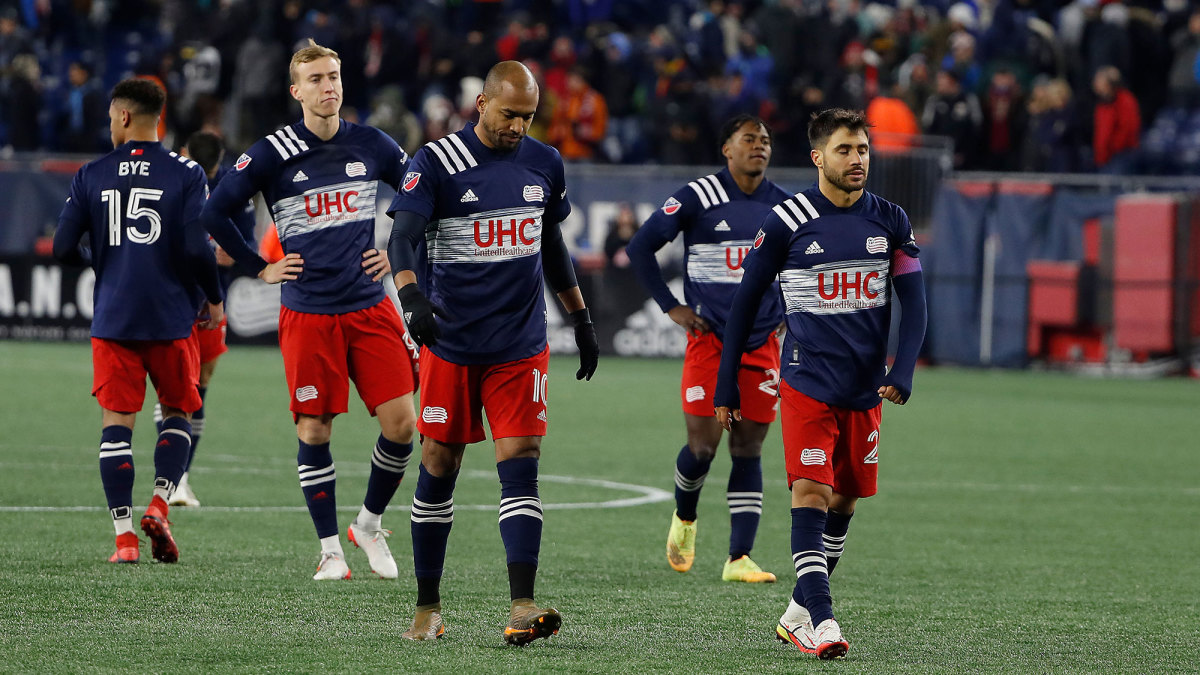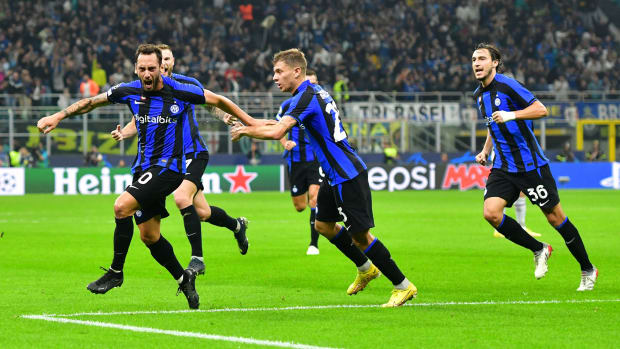MLS Has a Playoffs Problem. Or Does It?
Even though the weather was fine—cold but clear—the metaphorical storm clouds were gathering. The New England Revolution had just posted the most successful regular season in MLS history—a record-setting 22-5-7 romp that was good enough to win the Supporters’ Shield by a whopping 12 points. That’s a chasm in a league typically defined by fine margins.
Those were the reasons to expect a long playoff run (by MLS standards—it’s only 3-4 games). But there were just as many reasons to anticipate an early exit. A combination of factors that included a FIFA break and a bye that’s supposed to reward first-place finishers forced the Revs to wait 23 days between games. New York City FC, Tuesday’s Eastern Conference semifinal opponent, had started its playoff run with a win over Atlanta United nine days earlier. While New England had time to rest and heal, NYCFC had acquired a bit of knockout seasoning and steel. The awkward timing was a frequent topic of conversation as kickoff approached.
Longer-term history was on many minds as well. Shield winners haven’t fared well on their way to a legacy-defining MLS Cup. Since the league expanded its playoff field beyond eight entrants in 2011, only two Shield holders have reached the final (2011 LA Galaxy and 2017 Toronto FC). Top seeds—the first-place finishers in their conference—also were faring poorly overall. Since the 2011 introduction of the bye, the aforementioned LA and TFC sides are the only ones to make it through. That meant that heading into this year’s tournament, 18 of 20 top seeds had somehow failed to win just two playoff rounds. Then the Colorado Rapids, the West’s No. 1 seed this year, fell at the first hurdle, losing to the visiting Portland Timbers last week. And now it’s an astonishing 20 of 22, because NYCFC ousted New England on penalties.
"Certainly, we would’ve liked to have won the MLS Cup, but you know, those things happen when you get into the postseason with single elimination,” New England coach Bruce Arena said in the aftermath.
Indeed they do, and often. The MLS playoffs are unpredictable. They’re exciting. The question is, are they satisfying? Are they fair? Do they ask enough of lower seeds? Do they incentivize and reward regular season excellence? Are they connected at all to the bulk of the competition? Or do they render the preceding eight months moot (the regular season comprises 97% of MLS games), leaving the league’s most prestigious honor to be determined by logistics and a few bounces of the ball?
Conceptually, playoffs are good. They demand something that the regular season often doesn’t: clutch performance in critical situations. That’s just as valid a test of a potential champion as long-haul consistency. Playoffs are where legends and memories are made. But they have to be gratifying as well. The survivor should be deserving, and the champion’s credentials should be unquestioned.
All would agree that picking a winner by random draw would stink. So, deserve has got something to do with it. A title should be hard and fairly won. It should come at the end of a journey that rewards both consistency and an ability to master the moment. It should reflect a team’s quality, perseverance, talent and resilience, not to mention its composure under the knockout spotlight. A bit of good fortune is fine as well. Amid all that, there should be a reason for teams and fans to invest in the regular season, not to mention an appreciation for the regard that soccer traditionally holds for league play. That’s just good business.
In summary and at minimum, playoffs should be difficult to make or difficult to win. The other major U.S. men’s leagues (for now) all achieve one or both. But MLS’s current competition format is a bit of an inkblot test, indicating what a given observer prioritizes or enjoys. On the surface, and when considering the carnage in Colorado and New England, it appears the MLS playoffs might not be tough to make or win. A larger percentage of MLS teams qualify for the postseason (51.9%) than in the NFL, NHL, NBA or MLB. And once they get in, they’ve got to survive just three (for the top seeds) or four games. It’s a sample size at which, as Arena said, anything can happen.
That’s one perspective. MLS has another. After many years of experimenting with different formats, from the best-of-three series used through 2002 to the home-and-home format preferred until 2019, the league finally opted for what seemed like the inevitable: one-game knockouts. There are obvious and important advantages with the quicker, one-and-done tournament. It’s easy to follow. Nobody needs to explain “first to five points” or “aggregate goals.” And it’s easier to schedule. There are no “if necessary” matches, and the shorter duration reduces the discrepancy in offseason length between non-qualifiers and finalists. A two-month playoff gauntlet like the NHL’s and NBA’s would produce a very worthy champion, but it would leave almost two-thirds of the league confronting an untenable four-month winter break while others get no almost no rest at all.
And one-and-done is riveting. Every game is do-or-die, and every telecast promises drama. Nobody advances after a loss, which happens often in the problematic aggregate-goal system. There’s everything to play for, and at a league that often struggles to reach the mainstream, that sort of spectacle can only help. MLS regular season matches averaged around 285,000 viewers in 2021, according to reports. But the recent conference semis fared better, ranging from the average of 334,000 English-language viewers who tuned in Sunday and Tuesday, to the 1.85 million who watched the Rapids and Timbers celebrate Thanksgiving on Fox.
“You have what you hope to have in any sort of playoff format competition, which is you have great storylines and you have dramatic games. So I think it’s been everything we had hoped and more,” MLS Executive VP Todd Durbin told Sports Illustrated.
“And I don’t feel like there’s a sense at the end of it, in the vast majority of games, where you feel like the team that was vastly superior ended up on the losing end,” added Durbin, who oversees the league’s competition and player departments.
Arena made an interesting comment following Tuesday’s loss. Perhaps, he hinted, New England wasn’t as totally dominant as its record.
“We had a very good year, and you could argue that maybe we played a little bit in over our heads,” the veteran manager said. “We don’t have the best roster in the league. It’s got to get a little bit better, for sure.”
If the team with the vastly superior record wasn’t actually vastly superior, perhaps the seeds—and assessing whether the playoffs are fairer to the higher ones—aren’t foundational to the format. How much of an upset is a No. 4 beating a No. 1, really, when they’re potentially so similar? Durbin argued that MLS’s competitive balance means that “upsets” shouldn’t be unexpected, and that 90 or 120 minutes on home turf is sufficient advantage for the higher seed.
“What I would say is that in MLS you have teams that are better, but I don’t know that the gap between the quality of the teams is as stark,” he said. “The gap isn’t as stark as perhaps the seeding may indicate, in terms of the quality. If you look at our playoffs, the difference between being a 6 seed and being a 3 seed is one win sometimes. It’s 1/34 of the schedule.”
That clustering is big part of the reason why MLS thinks its playoffs are both hard to make and hard to win, and why it appears to be happy with the current format after nearly two decades of tinkering.
Among the five major men’s leagues, the MLB, NHL and NBA are pretty easy to characterize. The baseball playoffs are tough to make—just one-third qualify after a 162-game regular season grind—and the Stanley Cup and NBA Finals are tough to win. There, you don’t advance if the favorite has one uncharacteristically bad night, or even three. And you’ve got to win 16 games against playoff-caliber opposition to lift the trophy. There’s no gauntlet like it. Nobody doubts the credentials of any team that manages it, even a lower seed (the NHL routinely crowns conference champs that finished fifth through eighth, including eight in the 2010s).
The NFL and MLS are a bit more complicated. Last season, the NFL increased the number of playoff teams to 14, or 43.8%. It’s still more exclusive than MLS, but the difference will drop if the latter sticks with 14 as it expands to 30 members (it’ll be at 28 in 2022 as Charlotte FC enters). More playoff teams means more attention, viewers and potential TV dollars toward the end of the campaign, but does it minimize the importance of the beginning and the middle? Does it reduce the stakes? That’s not much of an issue for the NFL, which dominates the airwaves. But for MLS, selling those games from March through October remains vital.
Parity could ensure that there are almost no stakes on a given day, because you’re unlikely to fall far behind with a loss and could always catch back up with a win or two later on. The MLS regular season starts to really matter in September. Conversely, it could mean that every game, every minute and every play matters immensely because the margins are so fine. And that’s how MLS chooses to see it.
“I do think that it is very difficult to make the playoffs, and I say that is because I don’t think the way to look at it is to simply look at the number of teams that qualify versus the number of teams that don’t,” Durbin explained. “If you look at how close it is at the end, what that means is that when you talk about difficulty, you really can’t take a week off during the season because that will literally be the difference, potentially, between whether you qualify for the playoffs or not.”
But does it matter where you finish? It does in the NFL. There, it’s typically not enough to get in. An NFL game is a brutal, multi-hour slog involving dozens of players and coaches who halve the opportunity to wrest control and alter the outcome. Sixty minutes of football arguably is more representative of a team and a season than 90 minutes of soccer. A successful Super Bowl run of three or four games represents 17.6%-23.5% of a 17-game regular season, which puts the NFL in line with the championship workload for NHL and NBA teams (19.5%-34.1%). To win three or four of those is tough, and to do it on the road is that much tougher. Home field matters, and the better NFL teams—if record is an indication—win more often. From 2011 through 2020, during which just two of 20 MLS top seeds made the final, 12 NFL No. 1s reached the Super Bowl.
So does it matter where you finish in MLS as long as you’re above that playoff line?
Durbin argues that it does, and there’s evidence that the punishment or curse that seems to impact No. 1 seeds doesn’t trickle down.
“In terms of who was going to make the playoffs and as importantly, whether or not they were going to have to travel or be at home for the first game—or even potentially throughout the playoffs—what I will tell you is that our teams 100%, they fight for that every bit as much as they are fighting to try to advance in the playoffs,” Durbin said.
The performance of home teams in NFL and MLS one-off playoff games is actually similar. Since 1996, MLS’s inaugural season, hosts have won those matches at a 66.6% rate. In that same time frame, NFL home teams won playoff games at a 64.8% clip. The difference is that the bye seems to be a boost in the NFL while wreaking havoc in MLS. The MLS playoffs aren’t a crapshoot. During that 2011-20 span—since the MLS Cup field expanded beyond eight—10 No. 2 seeds advanced to the final, along with three No. 3 seeds. Only five of the 20 conference champions were No. 4 or lower (a sixth is guaranteed Saturday when No. 4 Portland faces No. 7 Real Salt Lake for the West crown).
That’s not an accident, Durbin said. One-off upsets obviously are inevitable, but a lower-seed going on a sustained run is less likely because MLS playoff games shouldn’t be considered discreet entities. They’re connected by training and travel, and those air and leg miles add up. What RSL is on the verge of doing, for example, is a significant outlier.
“[MLS teams] don’t look at it as a single game. They look at it as, 'I’d rather be at home than have to travel because it’s the aggregation up until the final,'” Durbin said. “When you start to look at it, if you were on the road and on the road again and then on the road again, that’s just a different lift than home-home-road, for example.”
And so MLS is going to stay the one-off course. The old best-of-three was kinder to the higher seeds and did produce more top-seeded finalists. But Durbin said the league wasn’t thrilled with the concept of a club advancing with a draw, and two rounds of best-of-three plus a final would take at least one week longer to play. The home-and-home format was a mess, and leaving it behind was the right move. Besides corrupting the nature of the sport by not counting a result earned over 90 minutes, it afforded next to no home-field advantage. Higher seeds advanced a paltry 53.8% of the time from two-game series (compared to 66.6% from single games and 69% from best-of-three).
Smaller tweaks aren’t in the cards either, at least in the short term. Awarding advancement to the higher seed in case of a tie, which happens in Italy's lower tiers and Mexico, isn’t an option. The league wants a victor and a celebration. Nor is re-seeding on the horizon, because it introduces further scheduling volatility. At the moment, home field is considered sufficient advantage for eight-months of regular season work.
As for the persistent failure of top seeds, Durbin said the league is keeping an eye on it, but that it’s too soon for action.
“If we’re six years in or seven years in and the No. 1 seed is getting knocked out in the first round every single time and they have a bye, I assume we’re going to all take a step back and try to figure out what’s going on here,” he said. “I don’t know that we have enough data at this point in time to come to that conclusion. Clearly one of the things that we do look at in terms of scheduling is time off between games, right? So I do think it’s an interesting aspect that we look at and that we have continued to look at.”
The long waits endured by the Revolution and Rapids, along with other high seeds in years past, were a function of the bye and the November FIFA break. There won’t be a break in 2022 because of the November-December World Cup, so the top seeds will be in action much sooner. And it’s tough to see too far beyond that because of the uncertainty surrounding FIFA’s impending revamp of the international calendar.
There is no easy scheduling solution. If the playoffs are short, then the risk of randomness increases while revenue falls. If they’re too long, there’s the offseason problem, plus the likely loss of a chunk of the drama experienced this month. MLS has been searching for a balance and feels, at this point, that it’s nearly there. As for its flaws, the one-off format might be like Winston Churchill’s famous description of democracy—the worst except for all the others.
In the end, questions about the importance of the regular season and rewarding higher seeds may not even be the right ones. It’s about the inkblot—about what you value. And MLS needs the conversation, and even the controversy, the playoff crucible creates. It wants fans engaged and its clubs to have a chance, and the league is proud of the fact that 19 different teams have reached a conference final over the past decade—the highest among the five men’s leagues—and that seven clubs have shared the past 10 MLS Cups. That variance is a feature, not a bug, and the league will gladly sacrifice a few high seeds to help it happen. It hopes that as many teams as possible have the opportunity to celebrate and make an impact.
That's why playoffs are vital. That’s where the impact happens. They offer second chances that reshape the narrative. If the regular season loses meaning, it’s because it fades as the postseason storylines take root. If a given underdog goes on a run, we look for reasons that they always had it in them. It changes our perception of that team, its potential and its trajectory. The amount of attention and adoration focused on RSL is, now, quite different than it was during its 2-4-0 stretch run in October and early November. But then a controversial call on Decision Day, a skin-of-their-teeth escape in Seattle and an outstanding second half last weekend in Kansas City vaulted RSL to the precipice of the pantheon. That’s the power of the playoffs. And the power of that quick rise, that quick reversal of fortune, that fine line between fame and failure, is clearly something the league and many fans prefer.
More Soccer Coverage:










